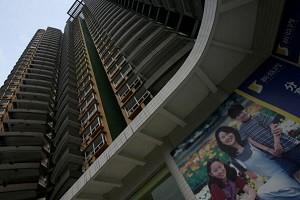In recent years, the disparity between the rich and the poor in China has increased, creating social discontent and instability. Because the social security system cannot keep up, people with an average income seem to either slide towards poverty or get stuck under financial pressure with no way out. This group of people burdened by both mortgage payments and taxes are becoming the fragile link in society.
A Very Different Lifestyle on the Other Side of the Street
According to the Guangzhou Daily , on the left side of Fengye Road in front of Tianhe Park, Guangzhou City, there are two new apartment building complexes which cost an average of 8,000 yuan per square meter (US$93/square foot). Most people who can afford to live in these two apartment complexes are considered to have above average incomes. However, on the right side of Fengye Road, there are the famous villages that house tens of thousands of workers from out of town, with only a few white-collar workers. Except for a few rich landlords, most people living there are considered to have low incomes.
There can be two very different social groups living across a narrow street from each other, separated by a run-down fence. In China, there are many such streets and fences.
Live a Low Income Life on an Average Income
Zhang Xu just moved into one of the apartments on the left (rich) side of Fengye Road. He has a decent job in Guangzhou and has some savings after several years’ hard work. At the end of last year, he spent over US$90,000 on an apartment. He immediately turned into an “apartment slave” and now owes the bank about US$50,000.
Of the US$1,000 Zhang makes every month, about US$400 goes to his mortgage and daily expenses, plus he has to mail money to his elderly parents. Not much is left for him every month. Zhang is struggling to make ends meet.
What worries Zhang even more is, if one of his family members gets sick, he will probably end up on the other side of Fengye Road. “It’s hard to go from the right (poor) to the left (rich) side of Fengye Road but extremely easy to go the other way once you lose your job, your company is not making money, or a family member is sick,” said Zhang.
Hard to Raise Social Status on Low Income
Among the tens of thousands of workers in the villages at the right side of Fengye Road, there are hardworking businessmen, cautious and conscientious workers, and young men who linger in front of the lottery stands hoping to become wealthy overnight. They all want to move up in social status. To their disadvantage, economic and social studies show that, without higher education, people with low income have very limited channels to raise their social status.
With Taxes and Interest to Pay, Average Income Groups Are Susceptible
Professor Yi Jiang, Director of Nanhua College of Industry and Commerce in Guangdong Province, said, “Currently, people with average incomes are the major source of income tax. They are also the main group of property buyers. Though they seem to have pretty good incomes, they actually have to bear double pressure—paying income taxes and interest.”
Statistics also show that people with average income are vulnerable and unstable. Dr. Wang Haigang, lecturer from Lingnan College of Zhongshan University, has long been studying the issue of income mobility. He stated, “From the 1980s on, there has been a long period of time that five percent of the population couldn’t maintain an average income. Most of them fell to the bottom of all income groups.”
Zhang Xu faces tough choices. “Sometimes I really just want to sell the apartment. I could take all the pressure off my shoulders, but I am really not willing to.”
Yang Yiyong, Vice Director of the Economics Research Institute of the National Development and Reform Commission, said, “All signs show that currently the average income group in our country is vulnerable and unstable. An average income class is not even taking shape in China.”
“In recent years, the disparity between rich and poor has become increasingly serious and caused much discontent. It has become a hidden danger to social stability. Unfair distribution of social resources, caused by monopolies and corruption, is often criticized by the public. People think corruption is the main reason for their poverty.”





